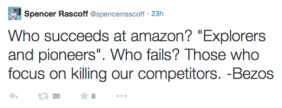
- SAP Community
- Products and Technology
- Additional Blogs by SAP
- Disruptors Don't Play By the Rules
- Subscribe to RSS Feed
- Mark as New
- Mark as Read
- Bookmark
- Subscribe
- Printer Friendly Page
- Report Inappropriate Content
Imagine you ran a business that virtually dominates the market. One day, you find out that a small start-up has somehow figured out a technology that lets your customers buy your product for 10% of your current price.
Modern business strategy instantly focuses us on how to protect our businesses from competitors. Our instant urge is to go to battle and compete hard. This is because the very foundation of strategy has been built on premises such as Michael Porter’s notion that the state of competition in an industry depends on five basic forces.
Hence, our immediate response to a new disruptor is to take them out as quickly as possible. We do anything within in our power to out-compete them, using whatever tactics possible, be it lawsuits, spreading Fear, Uncertainly and Doubt (FUD) through marketing or in many cases, acquiring them just to kill them off.
In 1999, when record labels and artists learned that a company called Napster created a peer-to-peer network to distribute music across the Internet, their reaction was swift and immediate. The labels and artists used their deep pockets to hire the best lawyers and launched multiple lawsuits against Napster. Eventually Napster could no longer afford to fight and declared bankruptcy in 2002.
Last year, Skiplagged.com started a site that offers a clever algorithm that reveals “hidden city” fares that can save travelers money by booking a ticket on a flight you never intend to take to its final destination. For example, say you want to fly non-stop from New York to Cleveland but the ticket is too expensive. The site will help you find a cheaper ticket to another destination that has a layover in Cleveland. So you book that flight and just don’t continue past Cleveland.
Within weeks, the site’s 22-year-old founder was slapped with lawsuits and cease-and-desist letters from United Airlines and Orbitz, even though all he was doing is helping consumers demystify the complex and unpredictable airline pricing schemes.
A small start-up called ClusterK has devised a far more efficient way to let users of Amazon Web Services (AWS) run applications on Amazon’s service for 1/10th of the regular price. Using a technology called spot instances, they enable consumers pay for slices of servers instead of paying for the full cost of dedicated servers.
How did Amazon react? They acquired ClusterK. To kill them off, right? Not the case. Amazon plans to use ClusterK’s technology to make their service more affordable for all their customers, which gives them a competitive edge. This is the level of thinking the defies what we commonly apply in strategy and reminds me of this tweet where Jeff Bezos was quoted during a speech:
This type of thinking turns what we know and do completely upside-down. Bezos and the AWS leadership team know that eventually prices for Cloud computing will continue to drop, as they have historically. So why not lead the charge? Instead of focusing on killing competitors, co-creation comes to the forefront and as a result, new value will be created for Amazon’s customers.
How might history be different if the record labels saw Napster as an opportunity, not as a threat of a “new entrant”? Would they be in a different position today? What if United Airlines actually embraced skiplagged.com’s technology to make their pricing more transparent to consumers?
Disruptors don’t play by the rules. Neither should companies that are being disrupted. The instinct to instantly go to war and focus on ‘killing competition’ has seen its hay day. It’s time for strategy and leadership to adapt to today’s realities. It’s no longer about just out-competing – the purpose of business is to add value for customers and ultimately society.
- SAP Managed Tags:
- Digital Technologies
- RISE with SAP advanced asset and service management package in Supply Chain Management Blogs by SAP
- 10+ ways to reshape your SAP landscape with SAP Business Technology Platform - Blog 3 in Technology Blogs by SAP
- Field Service Management and Beyond! Using Extensions and Configuration to Meet Your Specific Needs in Supply Chain Management Blogs by SAP
- ‘Dune: Part 2’ Box Office Inspires Spicy Supply Chain Comparison in Supply Chain Management Blogs by SAP
- Nonconformance Codes in SAP Digital Manufacturing in Supply Chain Management Blogs by SAP
